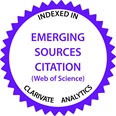ORCID
Sylwia Bąk 0000-0003-4398-0865
Piotr Jedynak 0000-0001-7335-6073
Przemysław Kaczmaryk 0009-0008-9438-6923
Keywords
Artificial intelligence (AI), small and medium-sized enterprises (SMEs), adaptation of AI, conditions
Abstract
Purpose: Small and medium enterprises (SMEs) are increasingly using artificial intelligence (AI) in their operational and strategic activities. In order to properly prepare for the processes of AI implementation and to plan the path of digital transformation using the tools it supports, enterprises need to be fully aware of the factors that determine a successful implementation of the processes. The aim of this text is to identify the key determinants related to the adaptation of AI tools and technologies in business processes and operations of SMEs.
Design/methodology/approach: In order to establish a catalog of adaptation determinants of artificial intelligence in SMEs, 24 deliberately selected academic texts indexed in the EBSCO database and published between 2021 and 2023 were analyzed. The research methods that were used are: an exploratory research approach and a single-step logical classification method, fulfilling the required criteria of exhaustiveness and separability in the selection.
Findings: Using an exploratory approach to literature research, we identified 55 different factors impacting AI adaptation in SMEs, which we divided into the following seven categories, using a logical classification method: strategy and business model, culture and attitude, resources, support, entrepreneurship and innovation, competitive position and environmental conditions.
Research limitations/implications: The research results have theoretical and practical implications. In the theoretical aspect, they can be a starting point for searching for methods to deal with identified determinants. In a practical aspect, the identified conditions may constitute a guide for SMEs planning to implement AI tools. A research limitation may be the fact that due to the dynamic development of the technological environment of SMEs, the identified catalog of determinants is certainly not closed.
Originality/value: The added value of the conducted research mainly concerns the identification and categorization of adaptation determinants of implementing AI in SMEs, which can significantly contribute to increasing the awareness of the SMEs about the challenges they face on the path of digital transformation.
Streszczenie
Cel: małe i średnie przedsiębiorstwa (MŚP) coraz częściej w swoich działaniach operacyjnych i strategicznych wykorzystują sztuczną inteligencję (AI). Aby odpowiednio przygotować się do procesów wdrażania sztucznej inteligencji i zaplanować ścieżkę cyfrowej transformacji z wykorzystaniem wspieranych przez nią narzędzi, muszą być one w pełni świadome czynników, które decydują o pomyślnym wdrożeniu tych procesów. Celem niniejszego tekstu jest identyfikacja kluczowych determinantów związanych z adaptacją narzędzi i technologii AI w procesach biznesowych i operacjach MŚP.
Metodologia/podejście: w celu stworzenia katalogu determinant adaptacji sztucznej inteligencji w MŚP przeanalizowano 24 celowo dobrane, opublikowane w latach 2021–2023 i indeksowane w bazie EBSCO teksty akademickie. Zastosowane metody badawcze to: eksploracyjne podejście badawcze oraz jednoetapowa metoda klasyfikacji logicznej, spełniająca wymagane kryteria kompletności i rozłączności doboru. Wyniki: wykorzystując eksploracyjne podejście do badań literaturowych, zidentyfikowano 55 różnych czynników wpływających na adaptację sztucznej inteligencji w MŚP, które z kolei, za pomocą metody klasyfikacji logicznej, podzielono na następujące siedem kategorii: strategia i model biznesowy, kultura i postawa, zasoby, wsparcie, przedsiębiorczość i innowacje, pozycja konkurencyjna i warunki środowiskowe.
Ograniczenia/wnioski z badań: wyniki badań mają implikacje teoretyczne i praktyczne. W aspekcie teoretycznym mogą stanowić punkt wyjścia do poszukiwania metod radzenia sobie ze zidentyfikowanymi determinantami. W aspekcie praktycznym zidentyfikowane uwarunkowania mogą stanowić wskazówkę dla MŚP planujących wdrożenie narzędzi AI. Ograniczeniem badawczym może być fakt, że ze względu na dynamiczny rozwój otoczenia technologicznego MŚP zidentyfikowany katalog determinant nie jest zamknięty.
Oryginalność/wartość: wartość dodana przeprowadzonych badań dotyczy głównie identyfikacji i kategoryzacji determinant adaptacyjnych wdrażania AI w MŚP, co może znacząco przyczynić się do zwiększenia świadomości MŚP na temat wyzwań stojących przed nimi na ścieżce cyfrowej transformacji.
Recommended Citation
Bąk, S., Jedynak, P., & Kaczmaryk, P. (2024). Adaptation determinants of artificial intelligence in small and medium enterprises. European Management Studies, 22(1), 76-97. https://doi.org/10.7172/2956-7602.103.4
First Page
76
Last Page
97
Page Count
22
Received Date
03.01.2024
Accepted Date
10.04.2024
Online Available Date
19.04.2024
DOI
10.7172/2956-7602.103.4
JEL Code
O3, M15, M210
Publisher
University of Warsaw







